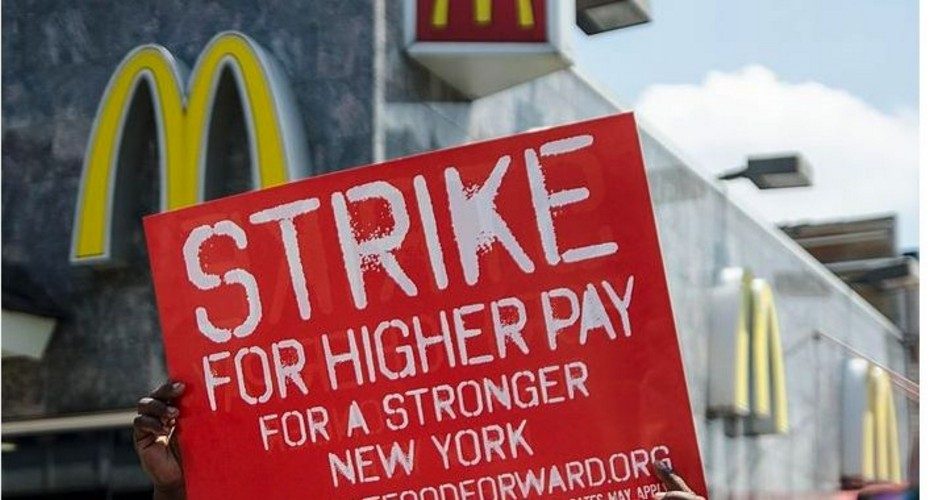
If more proof were needed that raising the minimum wage would increase unemployment among lesser-skilled workers, the Heritage Foundation’s latest study provides it.
For one thing, the push for a national minimum wage of $15 an hour would actually cost employers $18.61 an hour, thanks to payroll taxes, unemployment insurance and ObamaCare taxes. The proposed increase, if passed into law, would, according to Heritage, impact one-third of all American workers, and hurt the most those working in lower-cost states.
The math is simple, and deadly. The only way an employer could justify paying a worker $18.61 an hour would be if that worker can generate more than $18.61 an hour in value for that employer. That’s $37,700 a year just to break even. Most employers wouldn’t bother hiring unless his new employee could earn more than that very quickly.
The myth that the employer would just suck it up and pay his workers the new minimum wage is just that: a myth. He has many options open to him, including not hiring a new worker, or asking a present employee to take on additional duties. He could stop offering low-margin products or services altogether, or install technology (i.e., robots) to perform those duties. He could close down his business altogether, laying off those employees that he already has. Or he could move — that’s called “offshoring.”
Liberal economists (an oxymoron) agree with Heritage, but they’re keeping mum. Those willing to take the risk of going against the grain include Alan Krueger, who used to head up President Obama’s Council of Economic Advisors. Said Krueger: “A $15-per-hour national minimum wage would put us in uncharted waters, and risk undesirable and unintended consequences.… The push for a nationwide $15 minimum wage strikes me as a risk not worth taking.”
Another liberal economist, Harry Holtzer, a researcher for both the leftist Brookings Institute and the Urban Institute, also said the increase is “risky”:
Such increases are extremely risky. In job markets where young or less-educated workers already have difficulty finding jobs and gaining important work experience, such mandates will likely make it much harder…. Many employers will be very reluctant to pay high wages to workers whose skills — including the ability to speak English, in the case of many immigrants — are so modest.
Heritage found that many leftist economists are opposed to the minimum-wage hike, but are remaining silent. Dylan Matthews, a writer for the liberal news site Vox.com, said: “One really fascinating phenomenon: left-wing economists are saying off the record that $15/hr is super-dangerous, but [are] not saying that publicly.”
Just how many jobs are at risk if a federal $15 an hour minimum wage is mandated? Heritage quoted studies that showed that whenever labor costs go up by 10 percent, employment among less-skilled workers drops by seven percent. The federal mandate, applied across the country, would raise wage expenses by nearly 30 percent, according to Heritage, which would result in the loss of an estimated seven million jobs.
American Apparel, one of the largest apparel manufacturers in the country, is located in Los Angeles. When the city raised the minimum wage there to $15 an hour, the company eliminated 500 workers, planning initially to move them out of the city where there was still some modicum of common sense present. But when California started raising wages across the state, the company announced that it is exploring options to move its entire operation to another state.
The Heritage study failed to mention other impacts of such a mandate:
• Blacks would suffer the most. Before the Great Recession, unemployment among black teens was 29 percent. Today it is more than 40 percent. In Chicago, it’s closer to 50 percent.
• The poor would suffer as well. If they can’t find work that pays them today’s present minimum wage of $7.25 an hour, who thinks they will be able to find work that pays $15 an hour?
• Such a mandate violates freedom’s essence: to offer services to an employer who is then free to hire, or not, depending upon his needs and the individual’s skill sets.
• It would encourage more off-shoring of jobs to places where there are workers willing to work for less than $15 an hour.
• It would result in further increases in inner-city crime. Who thinks those unemployed and discouraged individuals are just going to spend their time in the library?
• It would consequently put more pressure on the existing welfare systems, to be funded by tax dollars from those remaining who still have jobs.
• It encourages moral decline. St. Paul put it well in his instructions to the church at Thessalonica: “When we were with you, we gave you this rule: Whoever will not work should not be allowed to eat.” But what if the government makes it impossible to find work?
And most importantly, where, among the Constitution’s enumerated powers, is the federal government given the power to determine what an individual shall earn, or not earn?
Senator Bernie Sanders (I-Vt.) has enlisted another far-left senator, Assistant Minority Leader Dick Durbin (D-Ill.), to sponsor his “Pay Workers a Living Wage Act,” which, as Heritage shows and common sense confirms, will do nothing of the sort. Instead it will be grossly counterproductive, increasing unemployment among those most desperately needing work, raising costs to employers, and encouraging many of them either to close up shop or move their operations out of the country. No one dares call this bill what it really is: a racist attack on the poor, legal immigrants, and the unskilled.
Photo of strike: Annette Bernhardt
A graduate of an Ivy League school and a former investment advisor, Bob is a regular contributor to The New American magazine and blogs frequently at LightFromTheRight.com, primarily on economics and politics. He can be reached at [email protected].



